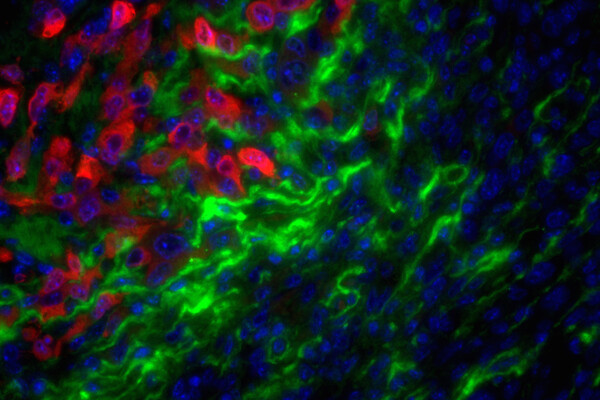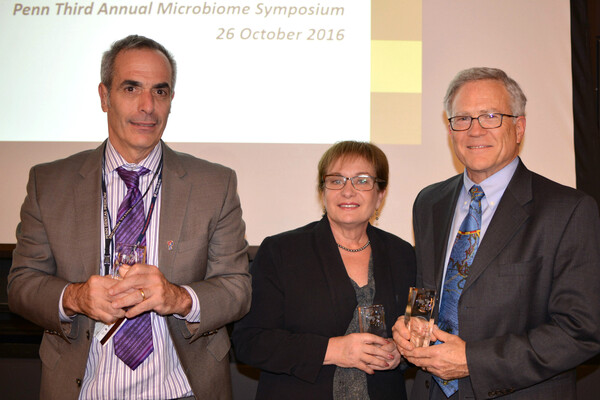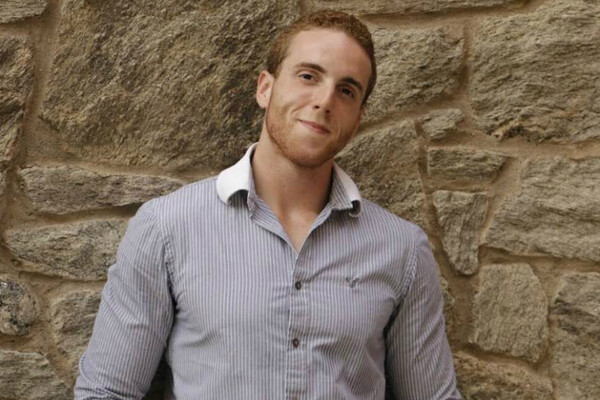5/2
Perelman School of Medicine
Penn Vet Professor’s Work in the Lab Aims to Improve Surgical Results
By Patrick Ammerman Oftentimes the most important scientific work is accomplished via serendipity; by following up on an unexpected finding and uncovering an entirely new area of research.
Penn Study Shows How Some Intestinal Cells Resist Chemotherapy and Radiation
When treating cancer with chemotherapy and radiation, decisions about dose must walk a fine line between attacking cancerous cells and preserving healthy ones. Overly aggressive radiation therapy to the torso, for example, can damage the epithelial cells that line the intestines, leading to chronic gastrointestinal problems.
Penn's John Farrar, Elliot Hersh and Rosemary Polomano to Receive 2016 One Health Award
John T. Farrar of the Perelman School of Medicine, Elliot V.
National Academy of Medicine Elects Two New Members From Penn
Two University of Pennsylvania faculty have been elected to the National Academy of Medicine, formerly the Institute of Medicine: Anita Allen, vice provost for faculty with appointments in the Law School and
Andrew R. Heyer Named Chair of Penn Medicine Board
Andrew R. Heyer, a member of the University of Pennsylvania’s Board of Trustees, has been named chair of Penn Medicine, effective July 1, 2016. He has served as a member of the Penn Medicine Board and its Executive Committee since 2009.
Penn’s Genomics Curriculum Makes the Latest Science Accessible to High Schoolers
By Patrick Ammerman A new University of Pennsylvania effort is bringing genomics into high school classrooms through a free online resource. The goal is to make it easier for science teachers to incorporate the latest advances in science into their curricula.
Penn Vet Study Identifies New Mechanism for Antibacterial Immunity
The innate immune system serves as a first-line defense, responding to infections almost immediately after a pathogen makes its way into the body.
Penn Cell Biologist Awarded $5.2 Million from NIH for Lung Regeneration Research
Penn Medicine researchers, along with colleagues at Cincinnati Children's Hospital and Boston University, have received a $5.2 million, seven-year grant from the National Heart, Lung, and Blood Institute of the National Institutes of Health (NIH) to study the cellular and molecular mechanisms that promote lung regeneration.
Penn Senior Counters Islamophobia With ‘Act of Love’ for Kids Affected by 9/11
Over the summer, as University of Pennsylvania senior Adam Adnane was riding the train with his father on the way home from his research position at The Children’s Hospital of Philadelphia, he quickly consulted his phone to find out when the Islamic holiday of Eid al-Adha was going to fall this year.
UV Light Robots Cut C. Diff Transmissions by 25 Percent on Cancer Patient Floors, Penn Study Finds
Robots are capable of all sorts of tasks to help better treat cancer: They connect oncologists to patients remotely, make incisions, staple them shut, deliver “nano” therapies—and they clean rooms.
In the News
Cannabis reclassification could be game-changer for U.S. drug policy
Michael Cirigliano of the Perelman School of Medicine says that marijuana deserves to be removed from the same category as LSD, heroin, and fentanyl.
FULL STORY →
Americans are sleeping more than ever. See how you compare
Mathias Basner of the Perelman School of Medicine says that work and traveling are the major sleep killers, with the majority of traveling being commuting to and from work.
FULL STORY →
Man does DNA test, not prepared for what comes back ‘unusually high’
César de la Fuente of the School of Engineering and Applied Science and Perelman School of Medicine says that Neanderthal DNA provides insights into human evolution, population dynamics, and genetic adaptations, including correlations with traits such as immunity and susceptibility to diseases.
FULL STORY →
How does fat leave the body? Experts explain the weight loss process
Colleen Tewksbury of the School of Nursing and Perelman School of Medicine says that waist circumference is a more accessible and potentially more helpful measure for fat loss than stepping on a scale.
FULL STORY →
Cardiac arrest recoveries are great stories, but they’re rare. We can fix that
In an opinion essay, Raina Merchant of the Perelman School of Medicine says that low survival rates for cardiac arrest can be improved by increasing rates of CPR.
FULL STORY →








